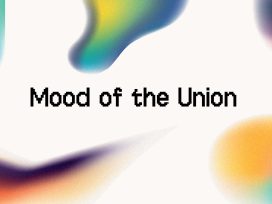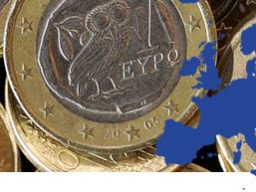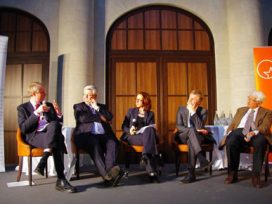17 articles

When the global financial crisis broke at the end of 2008, Europe’s leaders complacently maintained that the problem was an Anglo-Saxon one. Now, with trillions potentially having to be poured into national economies too big to fail – Greece, Ireland, Portugal, even Italy and Spain – the eurocrisis is threatening to overshadow the original banking collapse of 2008.
Brought on by the global economic recession, the eurocrisis has been exacerbated by serious faults built into the institutional structure of the monetary union. The non-existence of centralized political control over the European economy combined with lack of democratic legitimacy sets in motion processes that are undermining European solidarity.
In a new Eurozine focal point, published in cooperation with the Allianz Kulturstiftung, contributors discuss whether the EU is not only broke, but also broken – and if so, whether Europe’s leaders are up to the task of fixing it.

This Focal Point represents a cooperation between Eurozine and the Allianz Kulturstiftung.

The critique that Europe lacks representative legitimacy may well be correct, argues Ulrich Beck, but not when based on the principle of “no nation, no democracy”. Cosmopolitanization demands post-national approaches to democratic accountability in Europe.
Freemarket disregard for the elementary moral truths of debt and obligation is to blame for the current crisis, says Roger Scruton. But the call for a return to economic morality is no endorsement of the financial fictions of the social democratic state.
A European patriotism can be generated only through political acts that create a sense of solidarity, says historian Pierre Manent. If invocations of Europe are to be anything but vacuous, Europe needs to be decisive in defining its interests and demarcating its boundaries.
The eurocrisis is a logical consequence of the way the Eurozone was constructed, writes John Grahl. A dogmatic belief in the intrinsic stability of market economies left competitive imbalances ignored as easy credit provided the illusion of growth. The current attempts to stabilise the Eurozone are inadequate: a Europeanisation of debt is necessary.
Faced with the costs of the splintering of the euro, EU governments will, however reluctantly, have to agree to deepen not weaken integration, writes John Palmer, former European editor of “The Guardian”. And most voters will agree.

Can Europe really break apart? Yes, of course it can, writes José Ignacio Torreblanca. Few times in the past has the European project been so questioned and its disgraces so publicly exposed as now. It’s time to stop looking the other way.
Democratic deficit, enlargement fatigue and ever more rescue funds: is there still a future for a common Europe? In a discussion in Eurozine’s series “Europe talks to Europe”, prominent intellectuals and opinion makers from western and eastern Europe diagnosed causes for the current malaise of the EU.
Hazy though its contours might be, Greece’s economic crisis didn’t creep up from behind, writes Victor Tsilonis. The scandals littering Greek politics in recent decades indicate a chronic lack of accountability, culminating in the anti-constitutional approval of the EU/IMF loans.
The current financial crisis is not confined to economies, writes Daniel Daianu, former Romanian finance minister and MEP from 2007 to 2009. The erosion of the middle class, the spread of extremism and the threat to democracy are some of the more obvious social effects demanding attention.
‘We don’t just need firefighters; we need architects too.’ Interviewed in 2010 by Mittelweg 36, Jacques Delors (1925–2023), three times President of the European Commission, spoke of ‘this Europe of values’, its triumphs and failures, and his hope that a federal Europe of nation states would eventually become a reality.
When the financial crisis made clear the extent of western banks’ involvement in eastern Europe, concerns surfaced about the effects on western economies, re-awakening perceptions of the East as unruly and unpredictable. In the East, meanwhile, suspicions were reinforced that the West was interested in the new EU member states only insofar as they provided an opportunity to expand existing markets. What are the ethical and political implications of a globalized economy in general, and of western companies’ expansion in eastern Europe in particular? What does the European integration project really mean, not only economically but also at a social and cultural level? Romanian economist Daniel Daianu met Austrian author Robert Misik in Bucharest to discuss whether the failure of existing political and economic structures has opened up a new-old East-West divide. Moderated by Mircea Vasilescu, editor of Dilema veche and Carl Henrik Fredriksson of Eurozine.
Europe as outdoor museum? Threatened with extinction by all-consuming privatization and the pursuit of endless profit, self-musealization might be Europe’s only hope. Slavenka Drakulic has a scary vision of the future of the European way of life.



